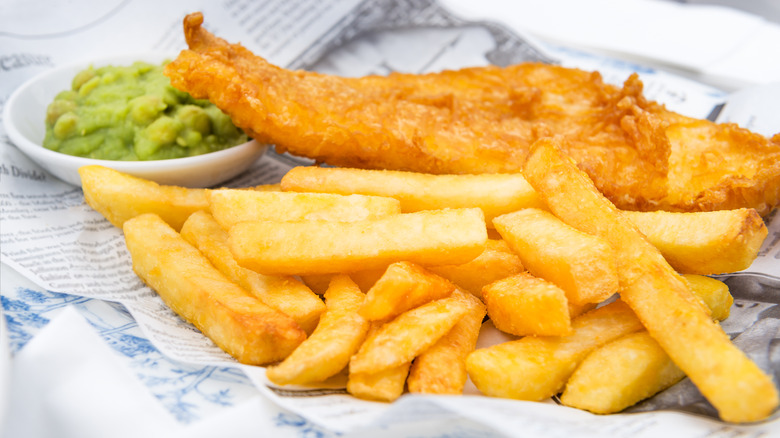The Origin Of Fish And Chips Is Likely Different Than You Think
When you think of fish and chips, you likely imagine the delectable battered strips of whitefish that are deep fried and served with the salty zip of crispy fries, most commonly associated with British cuisine. After all, you can find the dish in just about any English pub or, in the U.S., any English-style bar and grill. And it's this association that leads most of us to believe that fish and chips has its roots in the British Isles. However, that's not entirely true.
The accepted history tells us that the first battered and fried fish was brought to Britain in the 16th century by Portuguese Jewish immigrants fleeing religious persecution. Due to religious constraints, Jews weren't supposed to cook on their sabbath day, which goes from sundown Friday evening until the following sundown. Breading fish in a flour batter, or rolling it in eggs and bread crumbs, and then frying it before Friday night meant they'd have a preserved dish to eat during the Sabbath. As a bonus, the oil couldn't reach the fishy flesh and mute the flavor.
Once fried fish hit England, it was destined to be a hit. Thomas Jefferson even enjoyed "fish in the Jewish fashion" in England at the end of the 1700s. Once commercial fishing operations took off with the popularization of the steam engine in the 1800s, fried fish shops began to open all over the island. But where did the chips come in?
Chips get added to fish
The chips or "fries" half of fish and chips is a newer addition. Chips were likely created in either France or Belgium (nobody can decide), and chips weren't mentioned in British cookbooks until 1817. Even then, it's believed to have taken until the 1860s for the chips to be paired with the fish. This part of the story, however, probably did happen in England. It's unclear who first paired fried fish with chips, but it was first documented in the 1860s when Joseph Malin — a Jewish immigrant — started what's thought to be the first fish and chips joint in the country.
Some people argue that fish and chips weren't actually brought to England by Portuguese Jews, but rather that the dish evolved independently from many older recipes for fried fish, which have been found in literature from as far back as 5th-century Rome. This may be true, but it doesn't detract from the association of fish and chips with the Jewish immigrants, who popularized fried fish and had the genius idea of combining it with chips, and who served it in the first fish and chips shops. It's possible that some form of fried fish was eaten in England before the Jewish immigrants arrived from Portugal, but they had a major influence on the creation of fish and chips as we know it today.

